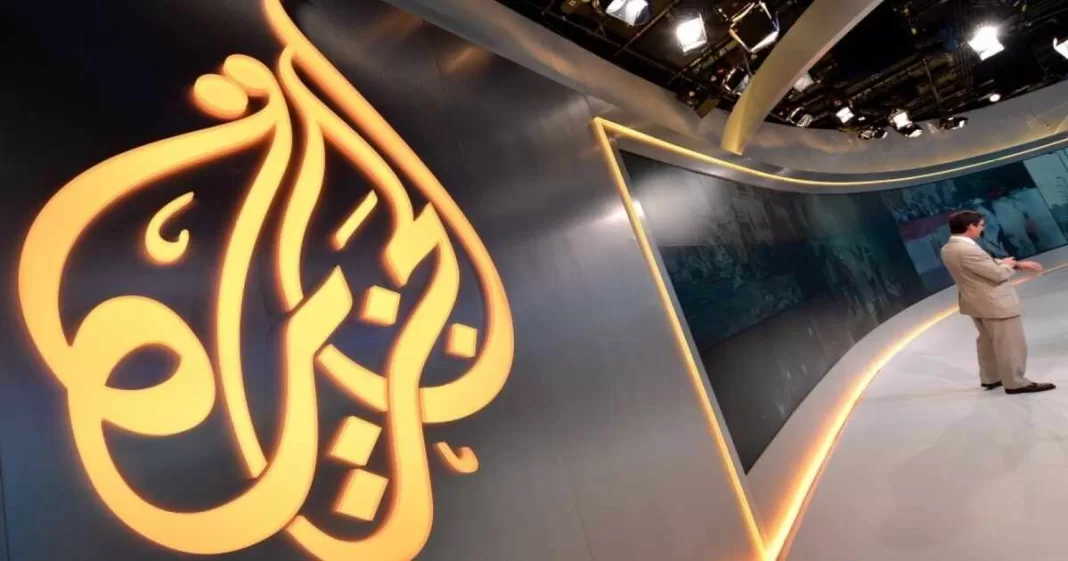Qatari broadcaster Al Jazeera said on Sunday that five of its journalists were killed in an Israeli strike, including a prominent reporter.
The Israeli military acknowledged in a statement targeting correspondent Anas al-Sharif, accusing him of being a “terrorist” affiliated with Hamas.
Al Jazeera said four others had been killed: correspondent Mohammed Qreiqeh along with camera operators Ibrahim Zaher, Mohammed Noufal and Moamen Aliwa.
Here are five things to know about the Arab media giant, which has been at odds with Israeli Prime Minister Benjamin Netanyahu’s administration since well before Israel’s war with Hamas in Gaza started on October 7.
Read more: Aid drop crushes tent camp in Gaza
– Founded by decree –
Al Jazeera was launched in Doha in 1996 by a decree issued by the former emir of Qatar, Sheikh Hamad bin Khalifa Al-Thani.
While stipulating that the channel should be “totally independent of all influences”, the decree also provided a $150-million government loan for “setting it up and covering its operating costs for five years”.
Though Al Jazeera Media Network is a private business, the broadcaster has retained some Qatari government funding, which its critics often cite when questioning its editorial independence from Doha.
The broadcaster immediately emerged as a rival to international media giants but its no-holds-barred coverage as the self-described “first independent news channel in the Arab world” also sparked a series of legal disputes in the region in its early years.
– Global reach –
The channel says it operates in 95 countries with 70 bureaus and a staff of 3,000 employees, with a global audience of more than 430 million homes.
Al Jazeera, the network’s initial Arabic-language news channel, was joined in 2006 by an English service.
Al Jazeera and Al Jazeera English, the network’s flagship channels, have distinct editorial lines with the Arabic-language channel more frequently facing criticism from within the region.
The network also includes a live public affairs channel, Al Jazeera Mubasher, and its digital-only AJ+ channel, which targets young audiences.
– Airtime for dissidents –
When a wave of popular uprisings swept the Middle East and North Africa in 2011, Al Jazeera was seen as a key shaper of public opinion because it gave unprecedented airtime to opposition groups, most notably the Muslim Brotherhood.
The network has repeatedly rejected any accusation of bias in its coverage.
Al Jazeera faced pressure from governments across the region and became the focus of feud between Cairo and Doha after the 2013 military ouster of Egypt’s Muslim Brotherhood president Mohamed Morsi.
Cairo considered it a mouthpiece for Morsi’s Islamist movement and Egyptian authorities arrested three Al Jazeera journalists, including Australian Peter Greste, provoking international condemnation.
– Regional blockade –
In 2017, Qatar’s neighbours, led by Saudi Arabia, imposed a three-year diplomatic and economic blockade on the Gulf monarchy.
As well as demanding Qatar cut ties with the Muslim Brotherhood and its sister organisation Hamas, and downgrade relations with Iran, the boycotting states also called for the closure of Al Jazeera and all its affiliates.
The channel called the pressure an attempt to “silence freedom of expression”.
– On the ground in Gaza –
Since war broke out in the Gaza Strip on October 7, 2023 triggered by Hamas’s attack on Israel, Al Jazeera has aired continuous on-the-ground reporting of Israel’s military campaign and its consequences.
Its broadcasts have been among the most watched in the Middle East amid widespread disenchantment with Western media coverage regarded as skewed in Israel’s favour.
In April 2024, Netanyahu called Al Jazeera a “terrorist channel”, saying he would “act immediately” to halt its activities after parliament passed a law allowing the banning of media broadcasts deemed harmful to national security.
The law was used to ban Al Jazeera from broadcasting from Israel as of May 5, 2024 and to close its offices in the country in a temporary but renewable measure. Israel later moved to revoke the press credentials of some Al Jazeera journalists.
The network has decried a “criminal” violation of “the human right to access information”.
Since the start of the Gaza war, Al Jazeera’s office in the besieged Palestinian territory has been bombed and a number of its staff have been killed.
Israel has repeatedly accused Al Jazeera journalists, including those killed or injured in strikes, of “terrorism” links or collaborating with Hamas.
Al Jazeera has fiercely denied the allegations and accused Israel of systematically targeting its employees in the Gaza Strip.














